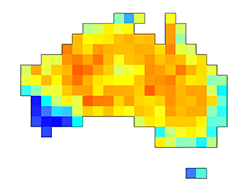TERN’s open-access landscape research data analysis tools have enabled researchers to put together a massive 13-year weather dataset to better understand the relationships between the environment and human behaviour. Meet the latest group of researchers using TERN’s free cloud-based virtual desktop, CoESRA, and learn how you can use it too.
Spring has well and truly sprung in Australia and long hot summer days are just around the corner. For many, this is a favourite time of the year, but unfortunately, warmer temperatures are also known to bring increased aggression and crime, says Heather Stevens of Macquarie University who studies the ways weather affects human behaviour.
“As the temperature climbs, so do the numbers of assaults, murders and sexual assaults. This could be in part a physiological response, where temperature affects our heart rate, hormone regulation and sleep, getting us ‘hot under the collar’, however it’s also a change in our routine – we are more likely to socialise, drink alcohol and party in summer and that behavioural change is linked to assaults.
Temperature and crime is one of the most extreme relationships between the atmospheric environment and human behaviour, yet our knowledge about it, until now anyway, is primarily based on Northern Hemisphere research.”
Heather Stevens, Macquarie University

To better understand this relationship and get that missing Southern Hemisphere perspective, Heather and her colleagues have used both temporal and spatial models to investigate the relationship between temperature, aggression and crime in Australia.
Big data analyses on the cloud made easy with TERN
Heather and her colleagues’ investigations started in 2018 with an in-depth analysis of the links between temperature and crime rates in New South Wales (NSW). They had the data they needed—11 years of locational-based crime figures for every suburb in the state—but they had a problem…
“We wanted to do pretty fine-scale analysis on weather interactions – daily and by suburb – however that resulted in a massive dataset, way too big to work with on any local computer we had.
My supervisor, Dr Ivan Hannigan of Sydney University, suggested using ‘CoESRA’, a virtual desktop tool provided by TERN. It allowed us to carry out computer heavy processes – often setting it up and letting it run overnight, knowing it would keep going without interruption.
In TERN CoESRA, Ivan shared an open-source package [‘AWAP Tools’] and helped me set up a reproducible data analysis workflow that I could add additional data and analysis steps to over time. We could also share it with our colleagues at other institutions while keeping it secure as per our ethics approval conditions.”
Heather Stevens, Macquarie University
As Heather says, TERN’s CoESRA Virtual Desktop allows researchers to perform complex analyses without having to have enough resources to run heavy analyses. It provides the infrastructure to not only re-use data but also tools for data manipulations, scripts for data visualisation and algorithms for analysis processes.
You can read all the findings of the team’s 2019 research here, but in short, the results of the work suggested that assault and theft counts were significantly higher in summer than winter.
Create simulations
Create, execute and
share
simulations
Save time & delegate
Access re-usable Kepler scientific
workflows and with Nimrod
K
distribute jobs
Connect globally
Connect with your team or
collaborate with researchers
from around the world
Store data
Store data for private
and public use
Some of the features of the TERN CoESRA Virtual Desktop
Facilitating reproducible, repeatable, transparent science
The team continued their investigations and several years later required updated weather data to look at how it related to aggression on social media. In a world-first, the study compared patterns of assault and social media anger with temperature.
Again, the work involved big data—a dataset of 74.2 million English-language Twitter tweets and updated spatial weather data from CSIRO’s Australian Water Availability Project (AWAP).
“Because we had the process chain of the 2019 weather extraction already in CoESRA, we were able to jump back in and update the data.
It enabled us to demonstrate sound reproducible science, increasing our project’s transparency by facilitating auditing and independent review.
Our research over the past three years was greatly enhanced through the use of TERN’s research infrastructure.”
Heather Stevens, Macquarie University
As reported in this recent journal article, Heather’s 2020 research had some pretty interesting findings, concluding that while generally online aggression declines with dropping temperature, it’s only to a point – in extremely high temperatures online anger does start to rise. They also, perhaps unsurprisingly, found the incidence of angry tweets is highest on Mondays!
- TERN’s Collaborative Environment for Scholarly Research and Analysis (CoESRA) is a free cloud-based virtual desktop platform accessible to everyone from a web browser.
- TERN’s virtual desktop comprises tools including Biodiverse GUI, Canopy (IDE for python and Notebook), Jupyter Lab, Kepler scientific workflow, Knime, LibreOffice Math, Macroeco Desktop, OpenRefine, Panoply, QGIS & RStudio and access to ample storage. All of these tools are accessible by logging into CoESRA using an Australian Access Federation (AAF) or Google account.
- CoESRA is developed by TERN in collaboration with many partners.
Applications and tools available in CoESRA

libreOffice

RStudio

ownCloud Client

Knime

Kepler

Canopy












